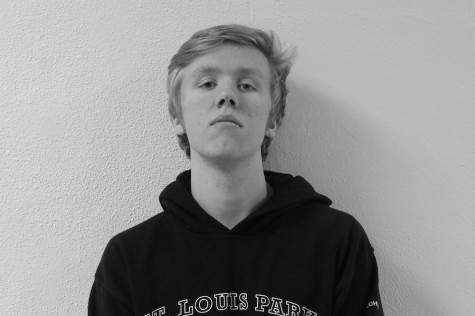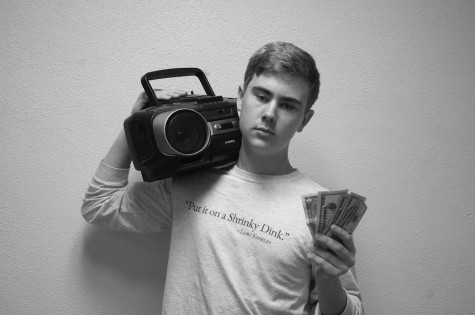How are we making it through?
Tragedies in the district left the community in a state of shock, confusion
April 30, 2014
“I try not to spend a lot of time asking, ‘why is this happening to us?’,” Superintendent Rob Metz said as he looked outside his office window and watched a therapy dog and its trainer walk back to their car after spending the day consoling grieving students and faculty.
Five days after suspending the search for Evan and Damian McManus, grief lingered in the hallways and classrooms, an emotion increasingly prevalent in the last two years following seven tragedies within the community.
The losses include Derrick Keller, a baseball player and recent park graduate who lost a battle with cancer; Andrew Dudley, a student who was hit on his bike on the way home from church; Joel Koch, a basketball coach who died from an aneurysm; Carly Christenson, a basketball player who passed away from the flu; Mohammed Fofana and Haysem Sani, two fourth graders who died on a fieldtrip to Lilydale Park; Abdullahi Charif, a seventh grader who drowned during a middle school gym class; and Evan and Damian McManus, a father and son who went missing while hiking in Colorado.
Some of the incidents occurred at a school in a class setting, while others took place across the country when school wasn’t in session. Some were drawn out and expected, while others a shock. Administration approached each tragedy individually, customizing their support strategy to fit the needs of the community.
“We do have plans, and we do have people that help us when this happens. Each one has been different though,” Metz said. “Whenever one of our students passes away or something bad happens we call Growing Through Grief, which is funded by Park Nicollet. They send someone here to work with our counselors and our administrators to create a plan for how we are going to help our students, and how we are going to help our community through this.”
On the day after the search was called off, senior Grahamm Kellogg said he didn’t attend very many classes. He talked with counselors for several hours and shot some hoops with his buddies to get his mind off of losing a friend he knew since he was 7. He still had a bewildered and shocked expression on his face two weeks later when he talked about the loss experienced in the community and personally.
“He was a really popular kid, and everyone knew him. There’s just definitely going to be a hole in the senior class at graduation,” Kellogg said.
Despite the grief brought on by the tragedies, Kellogg knows the community has grown stronger as a result. “I just feel like the St. Louis Park community is really tight knit and lends a hand when there are problems like this,” Kellogg said. “We’re a lot stronger than other schools because we’ve had to cope with so much and we’ve had to learn how to get past it.”
How do we help?
According to Metz, since each event was different it’s been difficult for administrators to realistically prepare for how to respond. Dealing with crises requires the time and focus of much of the administration and a lot of the work isn’t seen by the entire community. Besides supporting the students, communications need to be sent out to the media, contact with the grieving family is a priority and working with lawyers or law enforcement is sometimes needed. The administration has made it a priority to reflect back and learn from each experience.
“After each event we sit back and ask, how did yesterday go? What could we have done differently?” Metz said. “If we make mistakes, it’s not because of lack of effort. We start out with a general plan, and then we have to adjust it because every situation is different.”
Jesslyn Bolt, a trauma informed mental health specialist, has the difficult task of managing the district’s efforts to support when tragedy strikes.
Despite only being at Park for a year, she is disheartened by the tragedies in the district.
“I think people, myself included, are just frustrated with how many tragedies we see in the district. Whether or not we know the person, it affects all of us in some way. Whether it brings up our own issues in the past, or we had a close relationship with the person,” Bolt said. “I think it’s getting exhausting for a lot of people.”
“One of the hardest parts for staff and students is the unknown. Technically we still don’t know, and that’s really hard for a lot of students and staff,” Bolt said. “I think that if the students, the staff and the community can just continue to be kind to themselves and each other, take care of ourselves in order to take care of each other. I think that we will see a lot of growth in ourselves and our community.”
Does this change who we are?
There’s no doubt the tragedies have cast a shadow on the city of St. Louis Park and its students. When a school loses more community members than wins football games, it begs the question: does this change who we are? Metz said he knows these incidents have profoundly impacted the student’s experience and the city’s reputation.
“People ask me everywhere I go, ‘what’s happening? Why are you guys always the ones?’ There’s really no answer to those questions,” Metz said. “I think the happy-go-lucky high school experience of going to games and doing your studies and making friends; that’s all been dampened for the students who have been connected to these events and the school in general.”
Bolt said she knows five or 10 years from now, graduates of Park will still bear the wounds brought on by two years of grief; but hopefully the pain will dull.
“I don’t think the grieving process ends. When we experience something traumatic, that is something that is always with us. It is now a part of who we are. And it doesn’t change who we are, but it changes some things about how we might live our life,” Bolt said. “What I always say when students are grieving is that it’s never just going to disappear, never going to be like it didn’t happen, but over time it’s going to be less painful.”
From the outside looking in, some may see St. Louis Park as a community that can’t catch a break, but many, including Metz, know there is plenty to be proud of.
“We have a lot of happy stories,” Metz said. “It’s kind of sad that these things cover up some of the happy stories that are going on, because there’s a lot of happy stories.”
Shortly after Andrew Dudley’s death, the hashtag #SLPstrong started to appear all over social media. During the Christenson death and the McManus disappearance, the hashtag gained strength and use over Twitter, Instagram and Facebook, where a group was created just hours after the news of their disappearance and has since garnered nearly 6,500 members. The group was first a place for members to find information about the search and offer bits of hope, but as news broke of the search being called off, the group turned to a place of condolences and communal mourning.
When will this be over?
The string of incidents, some right after the other, have exhausted some of the students, faculty and administration. Metz recounted that while a Lilydale accident anniversary event is coming up, the administration is still in an ongoing investigation with the middle school pool and the community is grieving for the McManus loss. Aspects of each incident are still present in the community. This exhaustion begs the question, when are things going to be back to normal? And when they are, how do you know for sure?
“I don’t know. I’d say it’s probably in the faces of the students and teachers. Maybe you feel it more than you see it,” Metz said. “We’ve been in such a grind through all these things that I don’t know if we’ve fully recovered from one before another one comes along. But it would be great to have that feeling someday.”
The memories of the nine lost still remain in the community, and a sense of grief and mourning still pervades. Metz knows that we’re still on the road to recovery, and we still have a ways to go. “They’re all still here, they haven’t really gone away,” Metz said. “I hope we get to the point, and I know we will someday where we’ve passed through this dark cloud and we’re on the other side, but we’re not there yet.”




